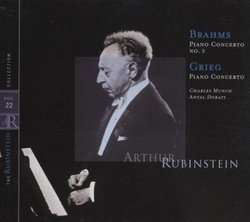| All Artists: Johannes Brahms, Edvard Grieg, Antal Dorati, Charles Münch, Boston Symphony Orchestra [members of], RCA Victor Orchestra, RCA Victor Symphony Orchestra, Artur Rubinstein Title: Rubinstein Collection, Vol. 22 Members Wishing: 1 Total Copies: 0 Label: RCA Original Release Date: 1/1/1949 Re-Release Date: 5/15/2001 Album Type: Box set, Original recording remastered Genre: Classical Styles: Forms & Genres, Concertos, Historical Periods, Modern, 20th, & 21st Century, Instruments, Keyboard, Symphonies Number of Discs: 1 SwapaCD Credits: 1 UPCs: 090266302222, 009026630222 |
Search - Johannes Brahms, Edvard Grieg, Antal Dorati :: Rubinstein Collection, Vol. 22
 | Johannes Brahms, Edvard Grieg, Antal Dorati Rubinstein Collection, Vol. 22 Genre: Classical |
Larger Image |
CD DetailsSimilar CDs
|
CD ReviewsRubinstein in Two of his Favorite Concertos Hank Drake | Cleveland, OH United States | 05/16/2001 (5 out of 5 stars) "Volume 22 of RCA's mammoth Arthur Rubinstein Collection features the pianist in his second recorded go-rounds of two of his favorite concertos. He recorded both the Brahms Second and Grieg Piano Concertos four times. The mono recordings on this CD were eclipsed by stereo versions made in the late 1950s. Rubinstein's 1952 performance of the Brahms Second Concerto is considerably more controlled than his 1929 version (Volume 1). There are a few inconsequential mistakes here-and-there. Magnetic tape recording was in its infancy at the time, and recording producers were a bit more cautious with tape splicing than in today's recordings, which are usually spliced together bar-by-bar. Nevertheless, this remains an extroverted, youthful performance of the concerto, far superior to Rubinstein's 1971 remake (Volume 71). The Boston Symphony Orchestra, under Charles Munch provides a glowing accompaniment. This recording was made in Boston's Symphony Hall, one of the most acoustically perfect halls in the world, and it shows in the vibrant, clear recorded sound.Rubinstein's 1949 version of the Grieg Concerto is given a crisp, bracing performance. Here, as in the Brahms, Rubinstein's subtle use of rubato is never allowed to interfere with the forward motion of the music. Antal Dorati and the RCA Victor Symphony Orchestra provide a strong accompaniment. (In reality, the "RCA Victor Symphony Orchestra" didn't exist. This was a name given to whatever pickup orchestra RCA could put together, whether in California, New York, or abroad. In this case, it was mostly assembled from musicians from Hollywood film scoring orchestras.) This recording was made at Republic Studio's film scoring stage in Hollywood. The sound is a bit dry, but well balanced and acceptable.Both of these recordings are returning to active circulation after an absence of over forty years. In an era populated by mostly note perfect but dull recordings, they are a welcome tonic." The epitome of the Romantic player! Hiram Gomez Pardo | Valencia, Venezuela | 04/21/2006 (5 out of 5 stars) "The figure of Artur Rubinstein in the musical stage was very similar respect Chopin in the previous Century. Far from his beloved Poland, this unforgettable pianist possessed the magnetic charisma, and joyful kindness to play the most profound Polish sentiment all around the world, with special emphasis in the Thirties when the figure and transcendence of Alfred Cortot was notoriously decaying. His double condition of emigrant and no one land citizen (due his Jewish roots) made of him a personality who surmounted the limits of the musical stages.
So, while the great number of directors and soloist were spread all around the world in the Thirties due political reasons, Rubinstein played the Romantic repertoire with notable solvency. We should remind his powerful performances in the Thirties until the middle Forties. In this sense this Grieg is loaded of forceful expression and fervent nationalist ardor and sublime vehemence. Particularly and in spite of the fact this Piano Concerto has suffered of a process of exhaustive abuse, this version remains among the most solid conceptual and musically performances in any age. You should not forget three additional performances: the fantastic version of Dinu Lipatti, the remarkable reading of the supreme colorist Walter Gieseking in the Forties, and finally the sensible performance of Radu Lupu n the middle Seventies. The Brahms Piano Concerto is exquisitely well phrased and played. Munch as always was superb conducting the legendaries musicians of the Boston Orchestra. Acquire this historical register before it' s too late. " |



